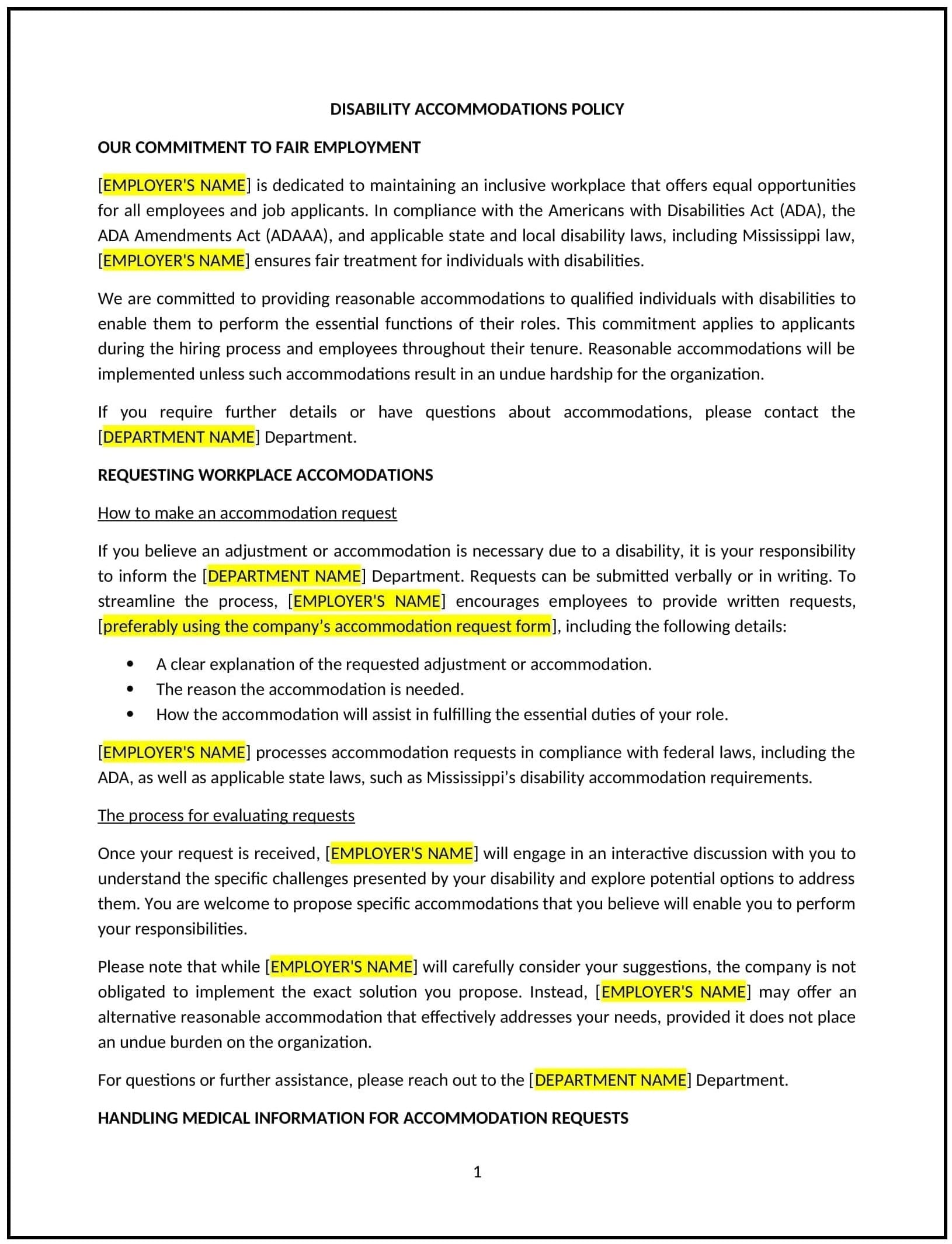Disability accommodations policy (Mississippi): Free template
Got contracts to review? While you're here for policies, let Cobrief make contract review effortless—start your free review now.

Customize this template for free
Disability accommodations policy (Mississippi)
A disability accommodations policy helps Mississippi businesses provide equal opportunities for employees with disabilities by outlining the process for requesting accommodations and how those requests will be handled. The policy ensures that employees with disabilities have the support they need to perform their job duties while fostering an inclusive and accessible work environment.
By implementing this policy, businesses can comply with disability laws, enhance employee satisfaction, and demonstrate their commitment to diversity and inclusion.
How to use this disability accommodations policy (Mississippi)
- Define disability: Clearly define what constitutes a disability under the policy, in alignment with applicable state and federal laws, such as the Americans with Disabilities Act (ADA). Include both physical and mental impairments that significantly limit major life activities.
- Outline the request process: Specify the procedure for employees to request accommodations, including the need for written requests, forms, or a meeting with HR. The policy should explain that employees can make accommodation requests at any time during their employment.
- Assess accommodations: Establish how the business will assess accommodation requests, including the criteria for evaluating whether an accommodation is reasonable, necessary, and feasible for both the employee and the business.
- Offer reasonable accommodations: Provide examples of possible accommodations, such as modified work schedules, assistive devices, or changes to the work environment. The policy should also state that accommodations will be considered on a case-by-case basis, taking into account the employee's specific needs.
- Ensure confidentiality: Emphasize that all accommodation requests will be handled confidentially to protect the privacy of employees and avoid discrimination.
- Set expectations for communication: Clarify that employees and employers will engage in a collaborative process to identify and implement reasonable accommodations. Employees should feel comfortable discussing their needs, and employers should be responsive and open to dialogue.
- Explain the interactive process: Detail how the employer and employee will work together to determine appropriate accommodations and ensure they are implemented effectively. This may include meetings with HR, managers, and medical professionals.
- Review and update: Regularly review and update the policy to remain compliant with changes in state and federal disability laws and to reflect feedback from employees.
Benefits of using this disability accommodations policy (Mississippi)
This policy provides several benefits for Mississippi businesses:
- Promotes inclusivity: Providing accommodations ensures that employees with disabilities are treated fairly and have equal opportunities to succeed in the workplace.
- Reduces legal risk: By adhering to state and federal laws related to disability accommodations, businesses reduce the risk of legal challenges or discrimination claims.
- Enhances employee morale: Employees who feel supported and valued are more likely to remain engaged and productive in their roles.
- Increases productivity: Accommodations enable employees with disabilities to perform their jobs effectively, which can lead to improved overall productivity for the business.
- Improves company reputation: A business that offers disability accommodations demonstrates its commitment to diversity and inclusion, enhancing its reputation both internally and externally.
Tips for using this disability accommodations policy (Mississippi)
- Communicate the policy clearly: Ensure that employees are aware of the disability accommodations policy and the process for requesting accommodations. This information should be easily accessible and included in employee handbooks and onboarding materials.
- Provide training for managers: Train managers and HR personnel on the disability accommodations process, including how to engage in the interactive process, how to assess requests, and how to handle accommodations in a compliant manner.
- Document all requests: Keep records of all accommodation requests, discussions, and decisions made throughout the process. This helps protect the business and ensures consistency in how accommodations are handled.
- Ensure flexibility: The policy should be flexible to address a wide range of needs. When evaluating accommodation requests, consider each situation on a case-by-case basis to determine the best solution for both the employee and the business.
- Foster a supportive culture: Encourage an open and supportive work environment where employees feel comfortable disclosing their disability-related needs and asking for accommodations without fear of judgment or retaliation.